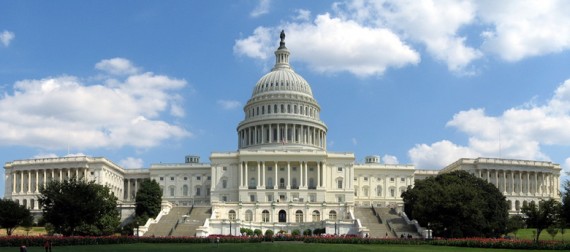Washington Already Gearing Up For The Next Budget Fight
The ink is barely dry on President Obama’s signature on the week long Continuing Resolution, and the final bill to fund the government through the end of September hasn’t even been made public yet, but Washington is already maneuvering for the budget battles to come:
Two fast-approaching debates could make this past week’s showdown look like a preliminary skirmish.
Congress soon must vote to increase the government’s borrowing limit to avoid the first-ever default on U.S. loan payments. With the 2011 budget battle still fresh, lawmakers are now focusing on the spending debate for the fiscal year that begins Oct. 1. The House Budget Committee has approved, on a partisan vote, a bill that would cut spending by $5.8 trillion over 10 years and make major cost-saving changes to the Medicare and Medicaid health programs.
These are the big-picture, big-money issues that tea partyers have awaited eagerly. Many have pledged to vote against a higher debt ceiling without major give-backs from Senate Democrats and President Barack Obama. The 2012 spending blueprint written by the House Budget Committee chairman, Rep. Paul Ryan, R-Wis., is on a collision course with Democrats determined to allow only modest changes, if any, to Medicare, Medicaid and other programs.
“It will be much more difficult, with much higher stakes, with the debt ceiling and the 2012 budget,” said Thomas Mann of the Brookings Institution, who co-wrote a book on Congress, “The Broken Branch.”
“I see little sign the tea party members and their allies will lower their demands or embrace a pragmatic strategy,” Mann said. “Boehner will have a hard time duplicating this success, especially if Obama is more forceful in filling the vacuum on the Democratic side of the debate.”
Obama’s re-election chances will depend partly on his ability to resolve these issues ahead. With some skill and luck, he may emerge either as a pragmatic problem-solver or the man who took reasonable stands against an out-of-the-mainstream GOP that forced a government shutdown or debt default.
In a statement shortly after the budget deal late Friday, Obama said some cuts will be painful and he acknowledged, “I would not have made these cuts in better circumstances.”
Additionally, the Administration also used the resolution of the 2010 budget debate to announce a speech next week on what Senior Adviser David Plouffe called a plan to address the deficit and debt:
“The president will be laying out his approach to long-term deficit reduction later this week,” Plouffe said on NBC’s “Meet the Press,” adding that Obama’s budget for 2012 has already put forward a plan for reducing the deficit by a trillion dollars over the next 10 years.
White House communications director Dan Pfieffer later added that Obama would deliver the address on Wednesay.
Plouffe said that Obama has already put in place much of his deficit commission’s recommendations, but he plans to lay out additional steps that need to be taken in this week’s speech.
“For instance, freezing the pay of federal workers for a period of time…Fundamental reform of the government…We obviously then have to do more,” Plouffe said. “And that’s what the president’s gonna lay out.”
Plouffe indicated that Obama would address finding savings in Medicare and Medicaid, but would not endorse many of the proposals in the long-term deficit reduction plan offered by Rep. Paul Ryan (R-Wis.), chairman of the House Budget Committee.
“It may pass the House. It’s it’s not gonna become law,” Plouffe said. “I don’t think the American people are gonna sign up for something that puts – most of the burden on the middle class, people trying to go to college, on senior citizens while not just asking nothing of the wealthy – giving them at least a $200,000 tax [break] and so that’s a choice you’re making.”
There is also talk of the Simpson-Bowles plan being revived, although Alan Simpson and Erskine Bowles recently endorsed Paul Ryan’s Path To Prosperity, as well as reports that a bipartisan group of Senators is working on its own plan. Rand Paul has put forward a plan. And, a few days after Paul Ryan’s plan was introduced, a group of conservatives in the House introduced their own plan that was even more ambitious than Ryan’s.
Could this be a sign that we’re actually going to have a rational conversation about the nation’s fiscal problems. I hope so, but I’m not going to hold my breath.


There will be a discussion but I am betting that it will be far from rational. But the direction of the talks will be towards cutting spending and reducing the deficit, courtesy of the Tea Party.
The problem is that as long as Obama is in the oval office (“THEIR” office) they are not going to care about the recovery, jobs numbers or macroeconomic indicators. Well, they’ll harp about said numbers but they won’t do anything to help the economy – au contraire. Another problem is that their short-sighted promises to the base – panicky anti-deficit measures (as we all know, deficits cause cancer), cut government spending rather than tax hikes for those who wouldn’t invest more even if their taxes went down – all hurt the economy.
You don’t go austere during a recession. You don’t worry about the deficit in a recession. It’s when your economy is strong that you start cutting the deficit.
Apparently, most Very Serious Commentators see the national economy as a household economy – if you have a deficit, that means that your entire life is ruined or something. Eh, no, numbskulls, nations are not households. The deficit- and debt-worrying is pathetic, and those responsible shouldn’t be anyway near Washington.
Actually, candidate Obama mumbled the words as well.
Tea Partiers are a mixed bag of nuts, and they’ve largely forgotten their budget focus at this point.
(Example: Christine O’Donnell, and the words “I am not a witch,” which should go down in history as how to end a political movement.)